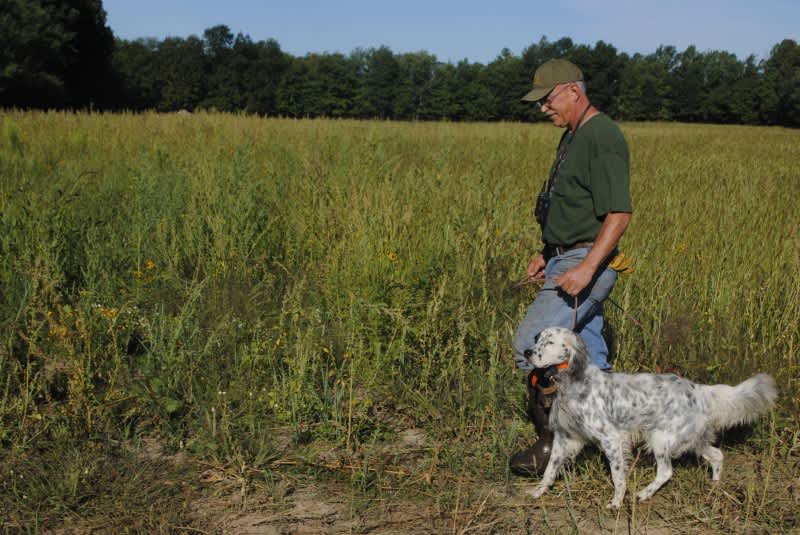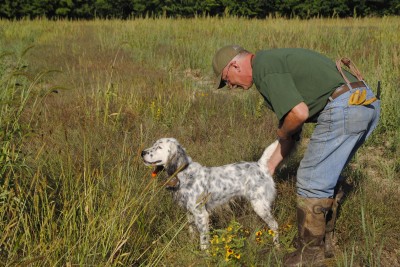Training Up for Michigan Bird Hunting Season
Bob Gwizdz 09.11.13

It happens every year, Tim Fox said. Bird hunting season is suddenly here and someone is on the phone with him with a bird dog problem hoping to get it fixed. Stat.
“Not everybody has got it together enough to have their dog ready,” said Fox, a veteran bird dog breeder and trainer. “And if you don’t have them ready, they’re not going to be able to do their job to the best of their ability.”
Fortunately, the season is not lost, said Fox, who attended his first dog-training seminar as a 12-year-old—42 years ago—and has been a hunting dog trainer ever since. But from here on out, any day not spent working the dog is a day you can’t get back, he said.
“The first thing you’ve got to do is fitness,” Fox said. “Hopefully you’ve been walking your dog at a minimum. Going into cardio running is pretty imperative. A lot of guys’ dogs are couch potatoes and fitness is paramount.”
Think about it. Hunting dogs are athletes. Even professional ball players go into training before the season begins.
Complicating the fitness equation is the often intolerable heat of early bird season. Hot weather does not excuse you from working your dog, Fox said.
“When running dogs, water them early and often,” says Fox. “I believe most dogs need to be watered 10 minutes into their run and then regularly afterwards. They need to be watered before they get thirsty.
“If you’re going to get your dog fit, you’re going to have to keep him hydrated while you’re working him.”
Fact is, Fox generally rubs a dog’s face and muzzle with water before he starts working it.
“It helps keep moisture in their nose,” he said. “It washes the dust off, which clogs their nasal passages, and it keeps their nasal passages moist so they can use their nose.”
Guys who do not have access to fields to run their dogs can get a lot accomplished on the concrete, Fox said.

“Take them for a walk,” he said. “A mile. If you can’t do any more than that, then do a lot of it. Twice a day is better than once a day. Short multiple sessions are better than fewer longer sessions.
“I know a lot of city guys who runs their dogs on a bicycle,” he continued, “That hardens up their feet. I know a lot when I go out West, lot of Michigan guys have problems with their dogs’ feet because the country out there is so hard. You can use applications of foot products—like Tough Foot—but I tend to run my dogs enough that their feet are plenty tough.”
At the very least make sure their nails are trimmed. “It’s easy for them to bust a nail,” Fox said. “A lot of guys don’t keep them short enough, especially with house dogs. They go out with long nails and they bust one and they come up lame. Keep them high and tight.”
Long-haired dogs can do with a haircut, too, Fox said, and it isn’t just to keep them cool.
“With a setter or any of the other long-hair hunting breeds, give them a field cut,” Fox said. “It really helps the ease of cleaning them after a hunt and it makes that much easier for us to check them out for burrs or wounds.”
Pay attention to the hair between their toes, too, Fox said.
“I’m lucky enough to have a groomer for a wife so she cleans them up for me, but a lot of dogs sit around all summer and get hairy around the feet and they’ll pick up burrs there. Clean those feet up.”
Fox recommends feeding your dog at the end of a work out—that’s when it is best able to process food, he says—and he always wants to work his dogs on an empty stomach.
“Always feed them the night before you’re taking them out,” he said. “A dog’s got to begin with empty bowels. They don’t need food in their system; they’re using oxygen to process that food and they’re also carrying extra weight. It sounds picky, but if you look at how dogs perform, they do their best if they eat the evening before.”
Whether you’re taking your dog for a romp at the dog park or just letting it out the back door, always put it on a lead before a work out, Fox said.
“If they’re not acting right on the lead, they’re not going to act right off the lead,” he said. “It also helps build your relationship. You need to be your dog’s leader and having him on a lead helps him understand that.”
Ruffed grouse season begins Sunday, September 15. Even a few days of work is better for your dog than none at all.
“I’ll get a lot of call in the next 10 days: Can you fix this? Can you fix that?” Fox said. “Some things can be easily fixed with the right approach. Some things are going to take time. But even if you can’t get it fixed right away, at least you can get a start on it. If you’ve got a dog that has a hole, you need to seek out some help, either from a professional or a buddy who’s got dogs.”
You can visit Fox at www.cfoxkennels.com or contact him at cfoxllewellins@yahoo.com.
For more information on Michigan hunting go to michigan.org. Click here to purchase a Michigan hunting license online.

